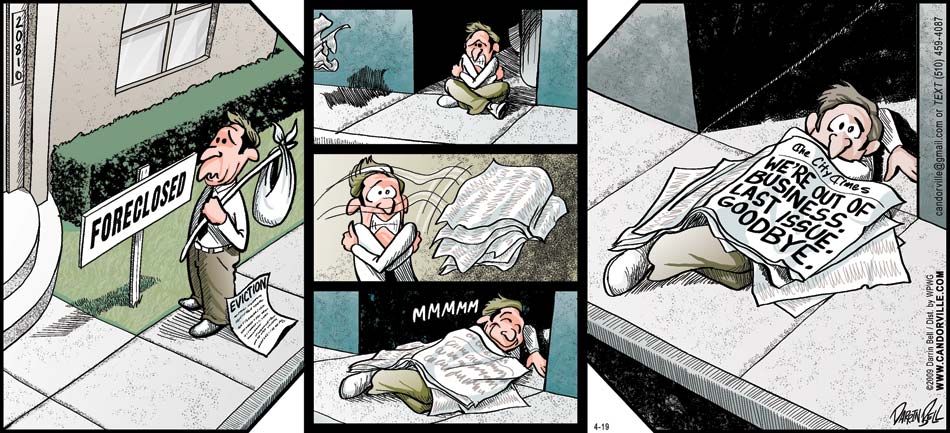This is not a good time to be working for the newspaper industry. The Detroit Free Press has cut several comics, including Candorville, because of the economy. If you want to see Candorville returned to Detroit, you’ve got to let them know right now by writing to features@freepress.com and/or calling 313-222-6400!
The Free Press is essentially merging with Detroit’s other paper, “The News,” and scaling home delivery back to only three days per week. The rest of the week, they’ll have skeleton versions of the papers available in racks in the metro area only. They’re cutting expenses every way they can, but because the comics page is generally cited as the main reason people pick up the paper, cutting back on comics is the best way to lose even more readers. If you’re in Michigan or you read the Free Press via mail or online, write to the Free Press and tell them you want Candorville back, and there’s a good chance they’ll listen to you.
Times aren’t good for cartoonists, yours truly included. The Seattle Times cut comics a few months ago, including Candorville. Reader response changed their minds and they brought it back. St. Louis cut back on comics (including Candorville) just a couple weeks ago, and now Detroit. In the alternative comics world, the best alternatives out there (e.g. “This Modern World”) just lost dozens of clients as a major alt chain decided it couldn’t afford to carry comics anymore. Publishers and editors don’t know how to stem their losses, so they’re slashing costs wildly. Blindly. You’ve probably noticed your favorite newspaper isn’t the paper it used to be. It’s smaller, lighter, less significant, and increasingly less relevant to your life. I worked for the Daily Californian (UC Berkeley’s student run paper) back in college. College papers have always been a pale shadow of major metropolitan papers. Yesterday, while I walked a few blocks to pick up some Thai food for lunch, I looked in the LA Times and LA Daily News newsracks. They were about the same size as the Daily Cal was ten years ago.
If you want to keep “Candorville” and other features in your local paper (or return it if it’s been cut), you have to write to them and tell them now, or you’re going to lose it. It’s only a matter of time, and time’s running short in this industry.





















